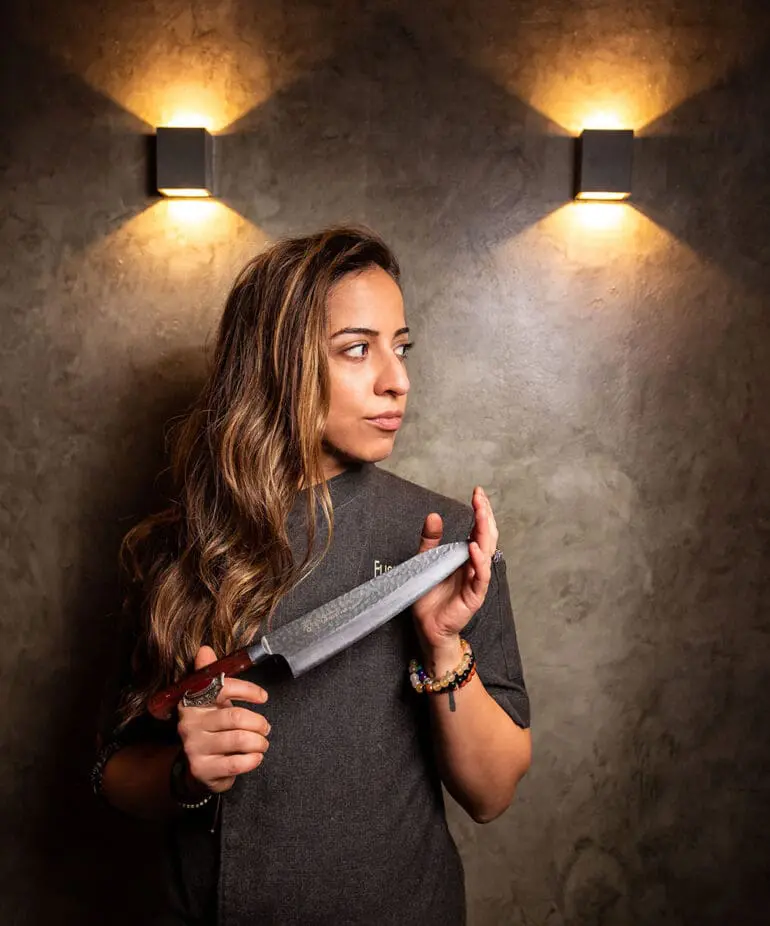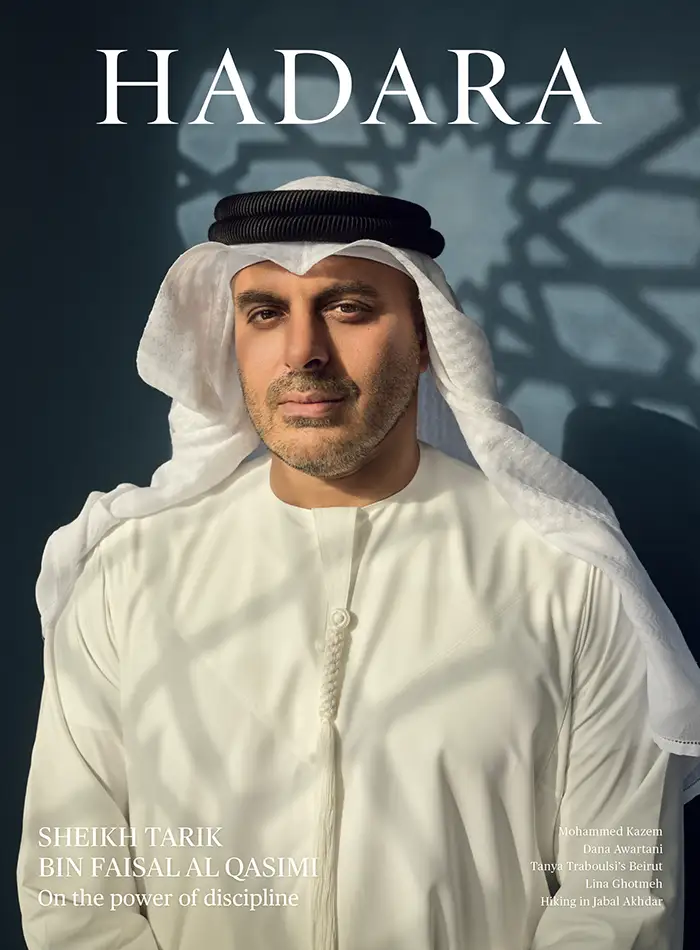The Beautiful Game
Tala Bashmi, chef-patron at Fusions by Tala, in Manama’s iconic Gulf Hotel Bahrain, aims not to fuse foreign and local cuisines but to meld past, present and future.
By Peter Drennan
How to be true to tradition without being stuck in the past? How to honour a culture yet push it to modernise? How to maintain a ‘family and friends’ feeling while aiming for the summits of quality?
If anyone can make peace between such contrasts, it’s Tala Bashmi, chef-patron at Fusions by Tala, at the top of the five-star Gulf Hotel Bahrain. The 34-year-old Bahraini doesn’t want to jump on the Asian fusion bandwagon so popular in the Gulf, but instead to pay homage to her tutelage by her father, while spinning the country’s cuisine into the 21st century and the global spotlight.
“When people talk about Middle Eastern cuisine, it’s usually the Levant region,” Bashmi says. “Maybe there are similarities between Bahraini food and Emirati food, but Levantine and Khaleeji cuisines are miles apart. I want you guys to know what our food is.”
Bashmi gives a modern, elevated twist to classic Bahraini dishes. Her version of popular street food tikka is made with prime tenderloin, or, on the tasting menu, A5 wagyu, rather than the traditional lamb. It’s marinated in black lime, cooked on charcoal, and served with dates on a perilla leaf. Another dish comes from her grandmother, chebba, the Bahraini pronunciation of kibba. “It’s a prawn dumpling stuffed with onions and raisins, cooked in a tamarind sauce. It’s a really old-school recipe,” Bashmi says. “It’s tart, it’s sweet, it has umami. I just want to use my chef knowledge to improve the texture. This is what I grew up eating. This is purely Bahraini.”
While focusing on Bahraini dishes, with their reliance on preserved ingredients like dried fish and shrimp, Bashmi freely borrows from other cuisines and deploys haute-cuisine techniques she learned at culinary school in Switzerland and stints at Michelin-starred restaurants there and at the Gulf Hotel before landing the top spot at Fusions. “Don’t let the name of the place trick you. Fusions,” she says. “That was the name that was here. People ask, ‘What do you fuse your cuisine with?’ Magic! Try it!”
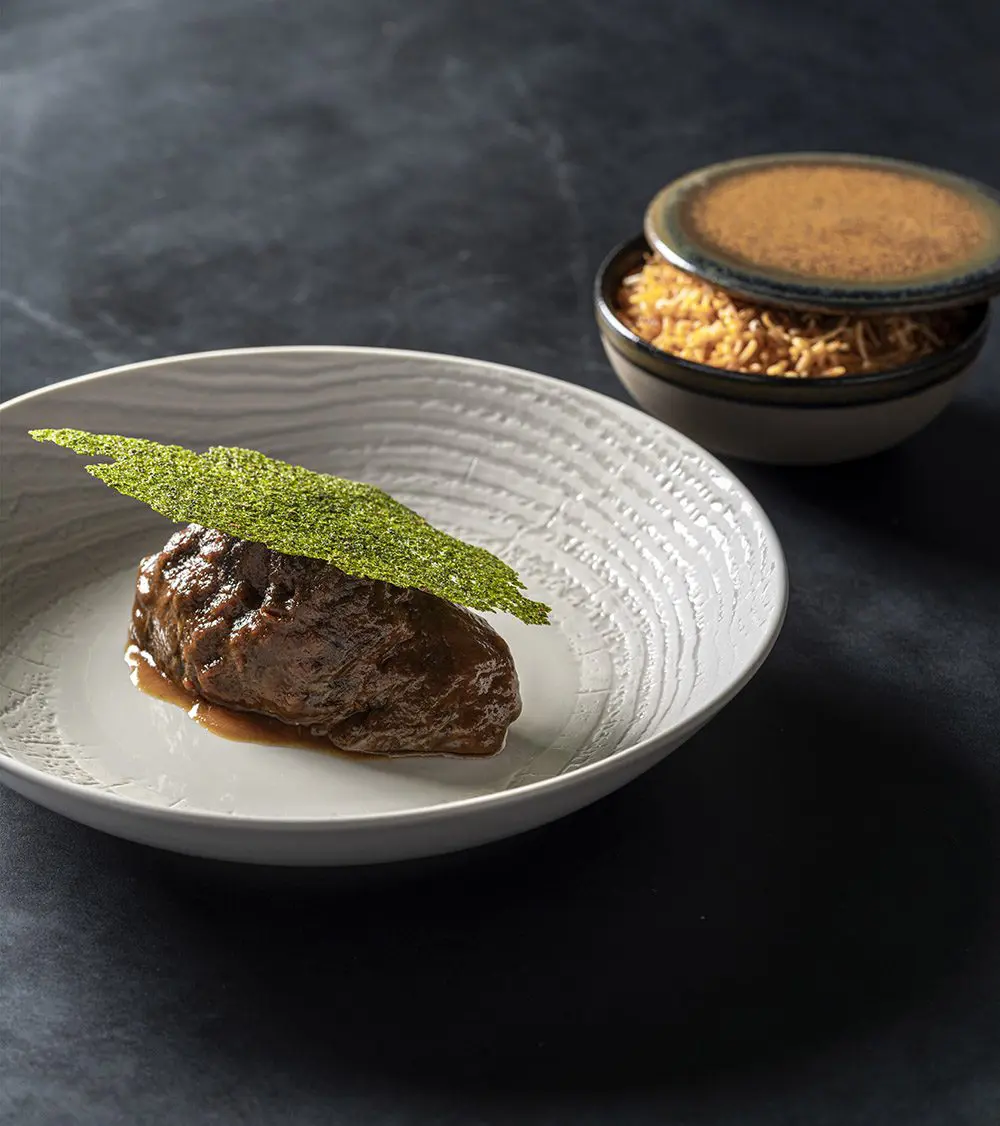
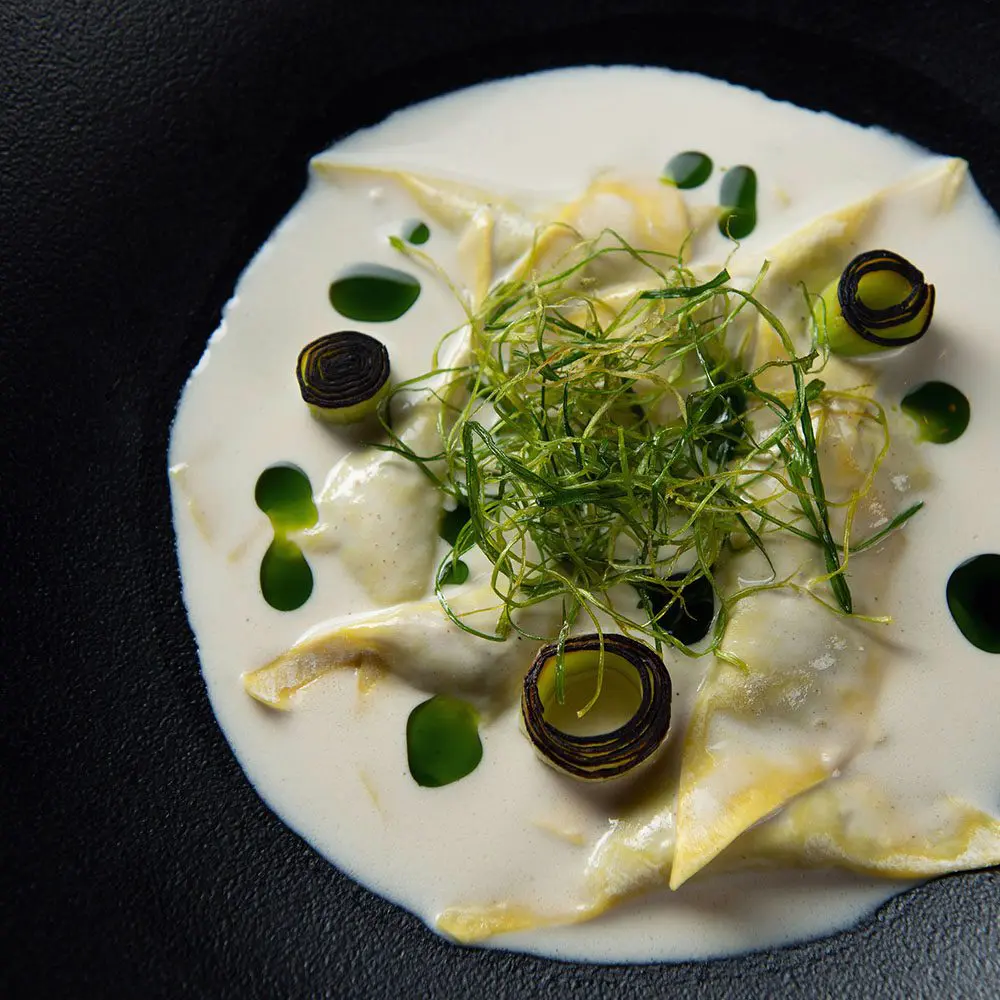
WHERE’S THE BAMIA? Slow-braised wagyu beef cheek topped with a shard of crispy okra and served with tomato-broth rice. LEEK & CLAM Leeks are served in ravioli with a clam foam and fresh, locally sourced clams. Bamia photo courtesy of Tala Bashmi; Bashmi portrait and Leek & Clam courtesy of Gulf Hotel Bahrain.
“The only time I’m nervous is when my dad comes to dine. He is so critical of every little thing, but I appreciate it because I know it’s out of love.”
In fact, Asian fusion has become the predominant restaurant trend in the region. Bashmi, an MBC Top Chef Middle East finalist in 2020, was named MENA’s Best Female Chef for 2022, but was among only a handful of chefs focusing on MENA cuisine. She also was named on the list of the world’s 100 best chefs last September alongside Heston Blumenthal, Rene Redzepi, Massimo Bottura, and Dabiz Muñoz, who topped the list for the second time. She was the only Arab. She was also among only 18 women.
Bashmi has mixed feelings about the awards. “It reminded me of growing up and playing football and people are ‘Oh, she’s really good for a girl,’” says the seven-year Bahraini National Team member (an injury when she was playing at university in the US ended her professional football dreams). “My team doesn’t see me as a female chef; they see me as a chef. A chef is a chef. And why don’t you do best male chef?” She recalls a comment by the producer of Top Chef: “‘Over the past four seasons, you’re the only person who came in here who was not ‘good for a girl.’ You just proved that you’re an amazing chef, not an amazing female chef.’ Thank you! That’s all I wanted to hear,” she says.
Bashmi produces dishes that are a lot like her: friendly yet daring. She spices up nostalgic recipes with challenging presentation or surprising ingredients. Take bamia, an okra-and-meat stew—delicious but not beautiful. At least not until Bashmi. She slow-braises wagyu beef cheek and tops it with a stained-glass-like shard of vivid green, crispy okra. Tomato-broth rice arrives in a separate bowl.
“I served it to my dad and he was like, ‘What is this?’ I said, ‘This is the bamia.’ And he said, ‘Where’s the bamia?’” Now the dish is listed on the menu as ‘Where’s the Bamia’ and is one of the restaurant’s signature dishes. “One of the biggest challenges with innovating our cuisine is how the older generation perceives change. I am constantly battling the understanding of what it is versus what it can be.”
Her father is her toughest critic. “The only time I’m nervous is when my dad comes to dine. He is so critical of every little thing, but I appreciate it because I know it’s out of love.”
As a young girl, Bashmi accompanied her father, a journalist who loves to cook, to the market, where he explained Bahraini food traditions. “He knows history, the origins of foods and ingredients,” she says. “I’ll ask him, ‘Baba, where can I get this?’ He’s my go-to.”
In a way, her father taught her to crack the seal on traditional definitions. “He goes to the market and buys crab, clams, shrimp and cuttlefish and he makes this almost curry-like thing. He uses the curry to cook the rice and calls it paella. It’s definitely not a paella, but it’s absolutely delicious and full of flavour,” Bashmi says.
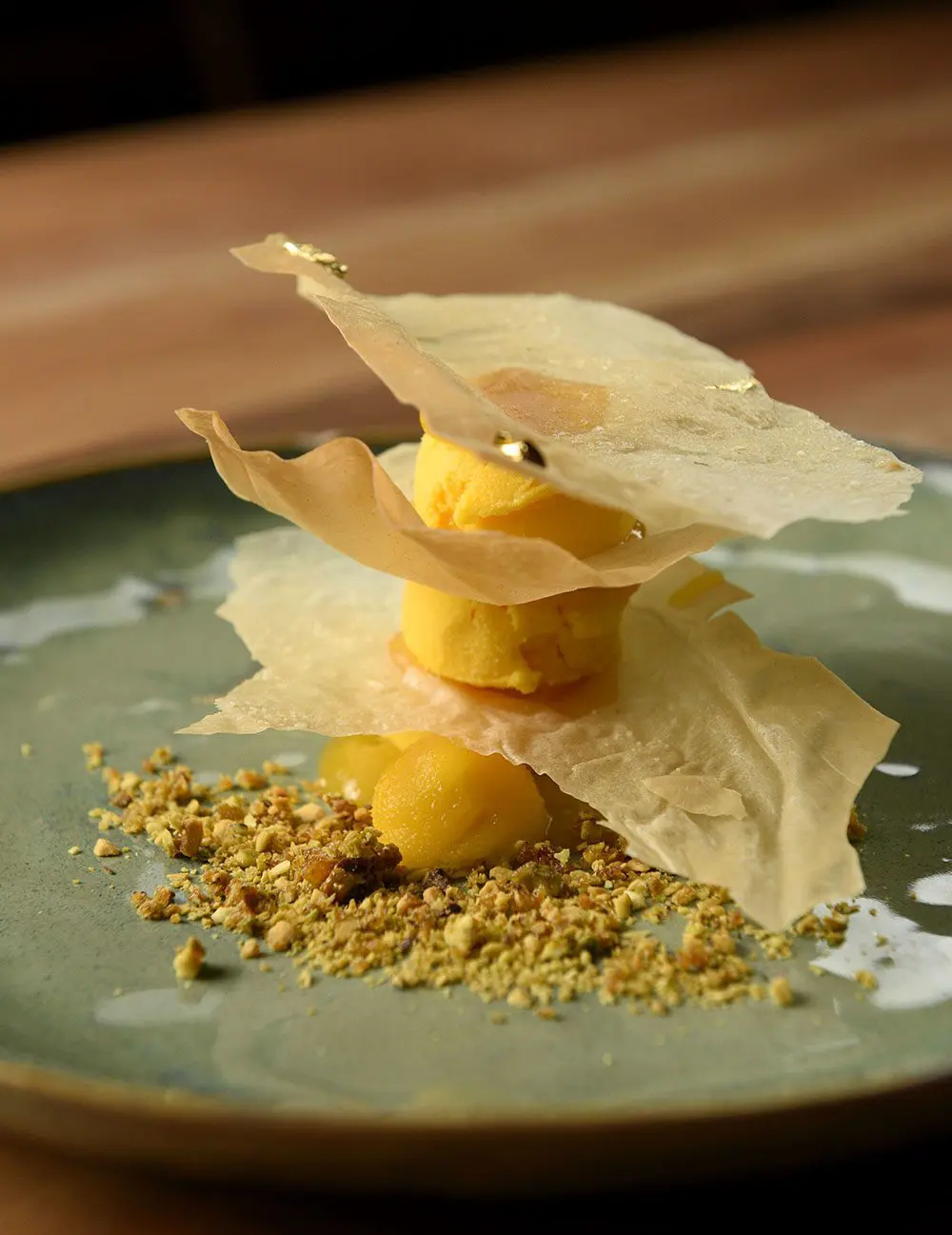
There is a playfulness to the dishes. Guests are invited to smash the layers of a delicate, deconstructed baklava. Bashmi studied illustration and fine arts in London and plates her dishes like artworks. Photo courtesy of Gulf Hotel Bahrain
Another past-meets-future dish by Bashmi is a dessert of raspberry sorbet with a peanut-butter ganache, white chocolate mousse and ‘bread crumbs.’ “At first you look at it and you’re like, ‘oh, that’s pretty,’ but once you eat it everyone is like, ‘that’s peanut butter and jelly!’” she says, something Bashmi ate daily growing up. “I always hope diners feel like they’ve tried or tasted something they’ve never tried before or done in a way that I want to stick with them.”
Fusions by Tala similarly mixes nostalgia and future. Industrial chic is softened by plenty of natural wood and warm lighting. Sweeping views of Manama’s Juffair district struggle to compete with the performance in the glassed-in kitchen.
An eight-course tasting menu is available once a month. Three of my favourites on a recent visit were oysters, lightly grilled on charcoal and served with labneh and a cucumber-shiso-jalapeño granita. ‘Leek & Clam’, two humble ingredients often overlooked or used as supporting flavours. Here Bashmi wanted to make them the stars. The leeks are served in ravioli with a clam foam and fresh, locally sourced clams. A dessert, ‘Fields of Lavender’—lavender sponge, layered with lemon crème brûlée, blueberry jelly, white chocolate mousse and almond Florentine, glossy, stone-like and flecked with edible gold—was almost too beautiful to eat.
“Our cuisine has always been about sharing, comfort, home,” Bashmi says. “It’s never been elevated to ‘this is how far we’ve gotten, this is where we’ve developed it.’ Our cuisine is always looked at as casual, simple. Nothing wrong with it, but I was like, ‘you know what? I want to play with this cuisine.’”
There is a playfulness to her dishes, a joyfulness. Guests are invited to smash the layers of a delicate, deconstructed baklava. But Bashmi also treats food as art—she studied illustration and fine arts in London. “Now I realise how images and artworks and colours are engrained in my mind and affect how I work, how I plate, and the colours I combine. You put everything together and I feel like it’s brought me to this. The physical aspect of football and the mental aspect of art, put together, are what makes a good chef as well,” she says.
Testing the boundaries of traditional Bahraini cooking and opening palates to new flavours, textures, and pairings, Bashmi hopes to bring her native cuisine the global interest it’s due. “I think that we haven’t had the spotlight shining on us yet. I know our cuisine is definitely the next. It’s done the circle. It’s going to be Latin America now for a few years. We’re right after that. Our time will come.”

